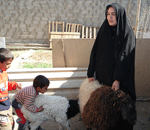Iraq: Political rows, insecurity and lack of data hinder development efforts
Published on Fri, 2012-12-14 08:45
Political disputes and security challenges have hindered the stability required for the development of Iraq, according to the Iraqi Al Amal Association’s contribution to the Social Watch Report 2013. To get on the right track, says Al Amal, the Iraqi government must conduct the census that has been delayed since 2007, to collect reliable information for the design of comprehensive, effective and appropriately funded development plans. Quality of life has fallen: poverty is not reduced, the educational system draws back and women are becoming more and more vulnerable. The inequalities persist between cities and rural areas and between men and women, summarized Manal J. Putros Behnam,main author of the Iraqi report. Putros Behnam explains that during the last 10 years, Iraq has undergone dramatic changes of rulers, but the much-expected transition to democracy failed to pave the way for development. Although the government issued in 2009 a strategy for poverty reduction, the efforts, resources and following-up have not been enough to see noticeable results on the ground. Iraq is not a poor nation, remarks the Al Amal expert, but much of its population suffers poverty. The standard of living of this middle-income country has declined over the last 25 years. There is a wide gap between the economy and the social reality experienced by Iraqi citizens. The per capita gross domestic product declined by a third between 1980 and 2006, from about USD 3,000 to USD 2,000. But the most striking data “is not just the decline, but also that reversal in growth stands in contrast to every other country” in the Arab region, according to the World Bank report “Confronting poverty in Iraq”, quoted by Putros Behnam. As an example of this trend, the World Bank study also notes that “primary school enrollment, an area in which Iraq once led the region, declined over the past 25 years in Iraq, while rising in every other countries of the region.” The National Strategy for Poverty Reduction sets the goal of reducing poverty rate from the current 22.9% to 16% in 2014. But the government failed to implement appropriate policies and measures to reach these and other targets, observed Putros Behnam. One out of five Iraqis between 10 and 49 years old cannot read or write, according to the Inter-Agency Information and Analysis Unit established by the UN in Iraq. In this matter there are “significant disparities” between women and men (24% to 11%) and between rural and urban areas (25% to 14%), and in the countryside this gender gap is even wider. “Decades of wars and years of humiliating blockade against Iraqi citizen (not against the Saddam Hussein’s regime), followed after that for the persistent political instability, insecurity, low standards of living and corruption have made up an accumulated process of decline that feeds illiteracy,” argues the Iraqi Social Watch report. The literacy programs run by UN agencies and the government need following up and sustained support from the Iraqi educational institutions to achieve a visible decline in illiteracy rates. Local NGOs have also implemented many programs all over Iraq, but these are pilot projects, poorly funded or lacking of a proper networking, the study adds. On the other hand, the number of female headed household increased after 2003, and the women who run those families, around 90% of them widows, are highly vulnerable, as well as their members. The International Organization for Migration confirmed in 2011 critical situations related to the access to work, food security, and housing conditions which make women headed households more prone to abuse and exploitation. The UN Inter-Agency Unit stated recently that child marriage “remains prevalent”, although they are illegal under 15 years of age and require authorization from a judge between 15 and 18. But in religious communities, many girls between 11 and 15 years of age are married and subsequentely deprived from education and health services. The lack of reliable information about the living conditions of the population is in itself an obstacle for development, but the national census has been postponed four times since 2007 under the pretext of security concerns. The government and its supporters have been delaying indefinitely the survey, required by the Constitution as a first step to settle the dispute over the internal Kurdish-Iraqi boundaries and over the Kurdish share in the national budget, which should result from the size of the population of each jurisdiction. This delay has prevented an accurate assessment of the numbers of orphans and widows who need urgent help and there is no date scheduled for conducting the census. Source |


